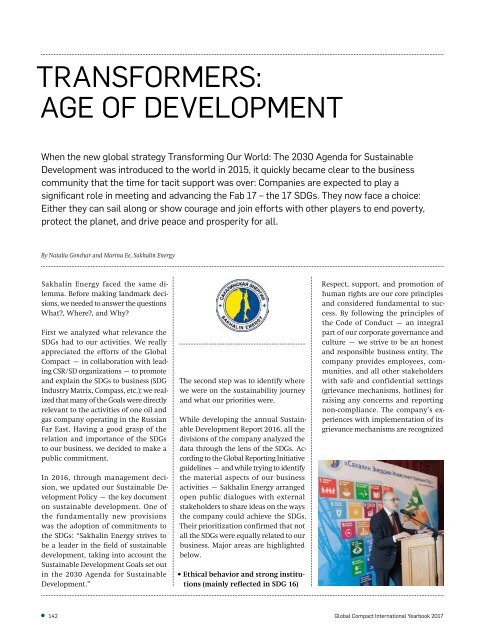Sustainability in Troubled Times
We live in times of uncertainty and global (dis)order. „Understanding global mega-trends is crucial. We live in times of multiple, evolving and mutually-reinforcing shifts“, says UN Secretary-General António Guterres. He adds: „These dynamics, of geopolitical, demographic, climatic, technological, social and economic nature, enhance threats and opportunities on an unprecedented scale.“ Therefore sustainability in troubled times is the key topic of this Sustainability Yearbook 2017, edited by macondo publishing. In the opening essay, Elmer Lenzen takes a critical look at the relationship between democracy and globalization. For decades this combination was a formula for success. Now both are experiencing troubled times. UN Global Compact founding director Georg Kell and Princeton professor Larry Diamond, who are well- known figures in this field, explain some of the reasons why in a profound interview. One reason is that today’s world is becoming more fragmented. So how can sustainability work in these times? It can work if we focus on the needs of the present without compromising the abilities of the future, says Global Compact Action Platform fellow Richard Roberts, and by utilizing the advantages of tomorrow. But doing the right thing in critical times is also a question of attitude. The entrepreneur Richard Branson and the actor Colin Firth both show in their own ways that sustainability means authenticity.
We live in times of uncertainty and global (dis)order. „Understanding global mega-trends is crucial. We live in times of multiple, evolving and mutually-reinforcing shifts“, says UN Secretary-General António Guterres. He adds: „These dynamics, of geopolitical, demographic, climatic, technological, social and economic nature, enhance threats and opportunities on an unprecedented scale.“ Therefore sustainability in troubled times is the key topic of this Sustainability Yearbook 2017, edited by macondo publishing.
In the opening essay, Elmer Lenzen takes a critical look at the relationship between democracy and globalization. For decades this combination was a formula for success. Now both are experiencing troubled times. UN Global Compact founding director Georg Kell and Princeton professor Larry Diamond, who are well- known figures in this field, explain some of the reasons why in a profound interview. One reason is that today’s world is becoming more fragmented. So how can sustainability work in these times?
It can work if we focus on the needs of the present without compromising the abilities of the future, says Global Compact Action Platform fellow Richard Roberts, and by utilizing the advantages of tomorrow. But doing the right thing in critical times is also a question of attitude. The entrepreneur Richard Branson and the actor Colin Firth both show in their own ways that sustainability means authenticity.
Create successful ePaper yourself
Turn your PDF publications into a flip-book with our unique Google optimized e-Paper software.
TRANSFORMERS:<br />
AGE OF DEVELOPMENT<br />
When the new global strategy Transform<strong>in</strong>g Our World: The 2030 Agenda for Susta<strong>in</strong>able<br />
Development was <strong>in</strong>troduced to the world <strong>in</strong> 2015, it quickly became clear to the bus<strong>in</strong>ess<br />
community that the time for tacit support was over: Companies are expected to play a<br />
significant role <strong>in</strong> meet<strong>in</strong>g and advanc<strong>in</strong>g the Fab 17 – the 17 SDGs. They now face a choice:<br />
Either they can sail along or show courage and jo<strong>in</strong> efforts with other players to end poverty,<br />
protect the planet, and drive peace and prosperity for all.<br />
By Natalia Gonchar and Mar<strong>in</strong>a Ee, Sakhal<strong>in</strong> Energy<br />
Sakhal<strong>in</strong> Energy faced the same dilemma.<br />
Before mak<strong>in</strong>g landmark decisions,<br />
we needed to answer the questions<br />
What?, Where?, and Why?<br />
First we analyzed what relevance the<br />
SDGs had to our activities. We really<br />
appreciated the efforts of the Global<br />
Compact – <strong>in</strong> collaboration with lead<strong>in</strong>g<br />
CSR / SD organizations – to promote<br />
and expla<strong>in</strong> the SDGs to bus<strong>in</strong>ess (SDG<br />
Industry Matrix, Compass, etc.); we realized<br />
that many of the Goals were directly<br />
relevant to the activities of one oil and<br />
gas company operat<strong>in</strong>g <strong>in</strong> the Russian<br />
Far East. Hav<strong>in</strong>g a good grasp of the<br />
relation and importance of the SDGs<br />
to our bus<strong>in</strong>ess, we decided to make a<br />
public commitment.<br />
In 2016, through management decision,<br />
we updated our Susta<strong>in</strong>able Development<br />
Policy – the key document<br />
on susta<strong>in</strong>able development. One of<br />
the fundamentally new provisions<br />
was the adoption of commitments to<br />
the SDGs: “Sakhal<strong>in</strong> Energy strives to<br />
be a leader <strong>in</strong> the field of susta<strong>in</strong>able<br />
development, tak<strong>in</strong>g <strong>in</strong>to account the<br />
Susta<strong>in</strong>able Development Goals set out<br />
<strong>in</strong> the 2030 Agenda for Susta<strong>in</strong>able<br />
Development.”<br />
The second step was to identify where<br />
we were on the susta<strong>in</strong>ability journey<br />
and what our priorities were.<br />
While develop<strong>in</strong>g the annual Susta<strong>in</strong>able<br />
Development Report 2016, all the<br />
divisions of the company analyzed the<br />
data through the lens of the SDGs. Accord<strong>in</strong>g<br />
to the Global Report<strong>in</strong>g Initiative<br />
guidel<strong>in</strong>es – and while try<strong>in</strong>g to identify<br />
the material aspects of our bus<strong>in</strong>ess<br />
activities – Sakhal<strong>in</strong> Energy arranged<br />
open public dialogues with external<br />
stakeholders to share ideas on the ways<br />
the company could achieve the SDGs.<br />
Their prioritization confirmed that not<br />
all the SDGs were equally related to our<br />
bus<strong>in</strong>ess. Major areas are highlighted<br />
below.<br />
• Ethical behavior and strong <strong>in</strong>stitutions<br />
(ma<strong>in</strong>ly reflected <strong>in</strong> SDG 16)<br />
Respect, support, and promotion of<br />
human rights are our core pr<strong>in</strong>ciples<br />
and considered fundamental to success.<br />
By follow<strong>in</strong>g the pr<strong>in</strong>ciples of<br />
the Code of Conduct – an <strong>in</strong>tegral<br />
part of our corporate governance and<br />
culture – we strive to be an honest<br />
and responsible bus<strong>in</strong>ess entity. The<br />
company provides employees, communities,<br />
and all other stakeholders<br />
with safe and confidential sett<strong>in</strong>gs<br />
(grievance mechanisms, hotl<strong>in</strong>es) for<br />
rais<strong>in</strong>g any concerns and report<strong>in</strong>g<br />
non-compliance. The company’s experiences<br />
with implementation of its<br />
grievance mechanisms are recognized<br />
142<br />
Global Compact International Yearbook 2017

















